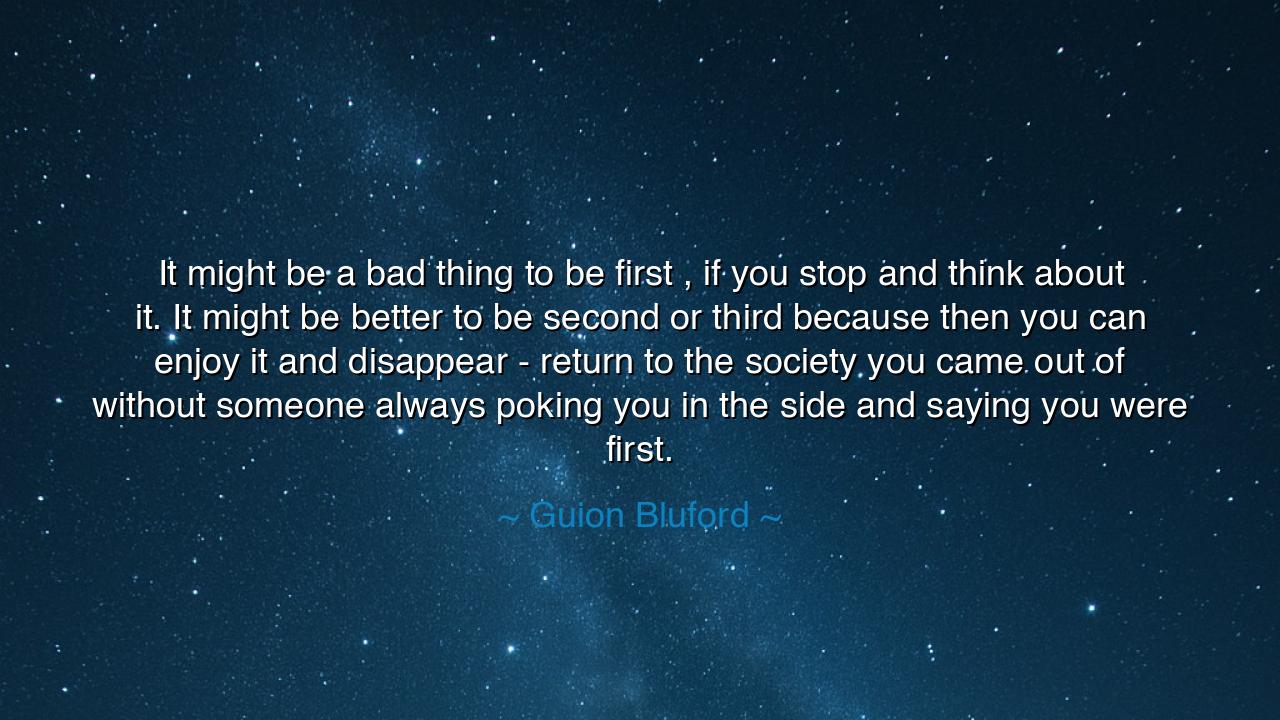
It might be a bad thing to be first , if you stop and think about
It might be a bad thing to be first , if you stop and think about it. It might be better to be second or third because then you can enjoy it and disappear - return to the society you came out of without someone always poking you in the side and saying you were first.






The pioneer of the heavens, Guion Bluford, the first African American to travel into space, spoke with humility when he said: “It might be a bad thing to be first, if you stop and think about it. It might be better to be second or third because then you can enjoy it and disappear—return to the society you came out of without someone always poking you in the side and saying you were first.” These words reveal the hidden burden of those who blaze trails into unknown lands. For to be first is both an honor and a weight; it is a crown that shines, but also one that presses heavily upon the head.
To be first is to stand in the light of history, yet also to carry the shadows of expectation. Society looks upon you not as a man, but as a symbol. Every action, every word, is measured, remembered, and judged. There is no quiet return to the life you knew before. To be second or third, Bluford reflects, is to walk in a path already cleared, to share in the triumph without being forever marked by it. Thus, his words teach us that greatness often comes not only with glory, but with loneliness, scrutiny, and sacrifice.
History gives us countless witnesses to this truth. Consider Jackie Robinson, the first African American to play Major League Baseball in the modern era. His name will forever be remembered, but his journey was marked by hostility, threats, and pressures that others after him did not bear so heavily. He was not allowed the luxury of simply playing the game; he carried the weight of a people, the burden of history. Like Bluford, Robinson knew that to be first is to endure storms that others may never face.
Bluford himself, though honored as a pioneer, carried this burden into the stars. His journey in 1983 was not only personal but symbolic—an answer to centuries of exclusion, a beacon for those who had been told that the heavens were closed to them. Yet he recognized that this symbolic mantle also meant he could never wholly “disappear.” His achievement, though monumental, also marked him forever, a reminder that sometimes the hero’s path is not chosen for ease but for the sake of those who come after.
The meaning of his words is both sobering and uplifting: that true pioneers do not always walk the easiest road. They are called to bear scrutiny so that others may walk in freedom. They are remembered not only for their victories but for their endurance under the gaze of the world. The first is a torchbearer, lighting the way for those behind, even if the flame burns their own hands.
The lesson for us is this: if destiny calls you to be first, do not shrink from it, but do not be deceived by its glamour. Know that it will cost you something—that you may not fade into anonymity, that you may forever be remembered more for what you represent than for who you are. But also know that your courage clears the path for others, that your burden becomes their freedom, and that your endurance writes history upon the hearts of future generations.
Practical wisdom flows: when you are the first in your family, your community, or your field to achieve something great, embrace it with humility. Do not expect rest, for eyes will be upon you. But also do not despair, for you are building a bridge for others to cross. And if you are not first but one who follows, honor those who bore the weight before you. Respect their sacrifices, and walk your path with gratitude for the doors they have opened.
So let the words of Guion Bluford echo across time: “It might be a bad thing to be first… It might be better to be second or third.” Yet let us also remember that the world needs the first—the brave, the pioneers, the ones willing to carry the burden of history. And though they may never fully return to the society from which they came, their legacy is eternal, and their sacrifice is the seed of progress for all mankind.






AAdministratorAdministrator
Welcome, honored guests. Please leave a comment, we will respond soon